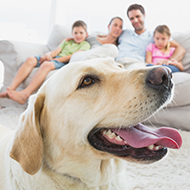
New rules prevent blanket bans on pets
(The Government has announced a new Model Tenancy Agreement which aims to make it easier for pet owners to find rented accommodation.
Under the new agreement landlords will no longer be able to issue a blanket ban on pets. Instead consent for pets will be the default position, and landlords will have to object in writing with a good reason within 28 days of a written pet request from a tenant.
Animal welfare charities have welcomed the move by the Government, which will reduce the numbers of pets brought into rehoming centres.
Peter Laurie, Battersea’s interim chief executive, said: “At Battersea we see far too many heartbroken owners forced to give up their pets due to housing problems – it’s the second biggest reason people bring their dogs and cats to us.
“[The announcement] demonstrates the Government’s clear, continued commitment to improving access to pet ownership for renters, as well as helping to support and promote responsible pet ownership.”
According to government figures, just seven per cent of private landlords advertise pet-friendly properties, despite the fact that more than half of UK adults own a pet.
Dr Ed Hayes, head of public affairs at The Kennel Club, also showed support for the new announcement. He said: “This clause within the new Model Tenancy Agreement is certainly a step in the right direction, encouraging responsible pet ownership as well as benefiting animal welfare.
“With interest in dog ownership during the pandemic increasing – and when so many people are isolated – it is vital that society adapts its rules and takes a long-term vision, to ensure that our pets can continue to be safely cared for and accommodated in our lives, on the long-term basis that they deserve and need.”



 The Veterinary Medicines Directorate (VMD) is inviting applications from veterinary students to attend a one-week extramural studies (EMS) placement in July 2026.
The Veterinary Medicines Directorate (VMD) is inviting applications from veterinary students to attend a one-week extramural studies (EMS) placement in July 2026.